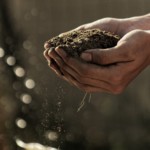Sustainable Farming
 Canola is a sustainable crop and ideal habitat for pollinators, offering nutritious nectar, plentiful pollen and dense, long blooming periods. As a result, the USCA calls for a federal incentive for farmers to grow more canola as honey bee habitat. It also supports all efforts to conserve resources, including water, soil, fuel and pesticides, during crop production along with crop rotation to protect farmland. Conservation efforts should include Integrated Pest Management — a holistic approach to farming that involves the judicious use of the most effective tools to control pests, including genetic, chemical, biological and cultural solutions — as well as cultivating wildlife on farmland, planting cover crops, omitting tillage and implementing other environment-friendly practices when possible per the U.S. Department of Agriculture’s Conservation Stewardship Program.
Canola is a sustainable crop and ideal habitat for pollinators, offering nutritious nectar, plentiful pollen and dense, long blooming periods. As a result, the USCA calls for a federal incentive for farmers to grow more canola as honey bee habitat. It also supports all efforts to conserve resources, including water, soil, fuel and pesticides, during crop production along with crop rotation to protect farmland. Conservation efforts should include Integrated Pest Management — a holistic approach to farming that involves the judicious use of the most effective tools to control pests, including genetic, chemical, biological and cultural solutions — as well as cultivating wildlife on farmland, planting cover crops, omitting tillage and implementing other environment-friendly practices when possible per the U.S. Department of Agriculture’s Conservation Stewardship Program.
USDA Natural Resources Conservation Service Offers Pollinator Habitat Incentive 10.28.20
Letter to UN Food Summit about agricultural representative 9.1.20
New Analysis Shows U.S. Agriculture Reducing Per-Unit GHG Emissions 4.14.20
Farmers Join Forces for Sustainability and Responsible Climate Policy 2.19.20
Farmers for a Sustainable Future: Fact Sheet 2.19.20
Farmers for a Sustainable Future: Guiding Principles 2.19.20
Letter to and reply from Crop Attractiveness Review Board on pollination requirements for canola 11.8.18 and 4.5.19
Letter to and reply from Natural Resources Conservation Service on improved crop rotation to benefits pollinators 4.27.18 and 6.8.18
Letter to NCRS for pollinator habitat enhancement in Conservation Stewardship Program 1.25.18
Letter to NCRS for pollinator habitat enhancement in Conservation Stewardship Program 12.5.17
Proposal to NCRS for pollinator habitat enhancement in Conservation Stewardship Program 12.5.17
USCA President Testimony to House Committee on Agriculture on pollinator habitat enhancement 4.4.17
Letter and proposal to and reply from NCRS on pollinator habitat enhancement in Conservation Stewardship Program 5.14.15 and 5.26.15